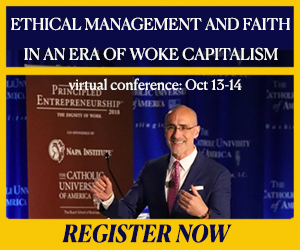Column: Integrating Faith and Work
What is “woke capitalism”?
This is a question that every Catholic should ask. Not just Catholic CEOs. Not just Catholic entrepreneurs. Not just Catholics in business school. Every Catholic, period.
Why? Because every Catholic believes in – and benefits from – an economy where everyone is able to succeed.
A flourishing economy is an expression of Catholic social teaching. It’s an environment in which all people have the chance to discover their gifts and the dignity that comes through work.
But that kind of economy is threatened. It’s under attack by woke capitalism.
What is “woke capitalism”?
Woke capitalism is the shorthand way to describe the trend in which social activists and politicians pressure companies to back their preferred policies. It’s all the rage right now.
From Wall Street to Main Street, companies of all shapes and sizes, and in every industry, are being told they have to get with the political program. If they don’t, then they’ll face criticism, attacks, threats and boycotts.
The ultimate goal is to drive these businesses out of business.
Look no further than the massive political campaign against Goya Foods, which started simply because the CEO said something positive about the current presidential administration.
In other words, woke capitalism is a synonym for bullying in the economic space.
What, exactly, do these activists and politicians want businesses to do? They want job creators to wade into the most morally charged and divisive issues of our time. Climate change. Political censorship. Sexual ethics. Abortion. The list goes on. Whatever the issue, chances are good that businesses are being asked – or rather, told – that they have to adopt the “progressive” perspective.
What’s the problem with woke capitalism?
The problem is that by forcing businesses to toe the “progressive” line, real progress gets hurt. Specifically, the kind of the progress that comes from innovation, entrepreneurship, and job creation.
Woke capitalism fundamentally misunderstands the role of business.
Companies are designed to improve people’s well-being and deliver opportunity and prosperity far and wide. They do so by empowering their employees and finding new ways to serve their customers. The more they do this, the more people they help, and the more progress they spur.
When businesses focus on being the best business possible, everybody benefits.
Another way to describe this is “Principled Entrepreneurship.” It’s a principled way of doing business, one that’s focused on maximizing a company’s contribution to society.
Woke Capitalism vs. Principled Entrepreneurship
Woke capitalism is the opposite of principled entrepreneurship. Although its defenders sometimes talk about principles, they’re really asking businesses to make value judgments – none of which actually bear on business.
By turning a company’s focus toward political causes and social issues, woke capitalism makes it harder for businesses to do what they do best.
The damage comes in two forms.
First, woke capitalism causes companies to spend precious resources on political gamesmanship and virtue signaling. Every dollar that’s spent on those causes is one less dollar devoted to research and development, new locations, wage hikes, benefit bumps and new jobs. It’s a waste of money that quite literally leaves people worse off.
Second, woke capitalism excludes people from the economy. When it tries to drive companies out of business, the message is that people who disagree need to steer clear. This discourages people with differing views – including people of faith, like Catholics – from taking a risk and starting a company and creating jobs. They start to fear that if they jump in, they’ll get jumped on just as quickly.
How does it help society when someone who has a good entrepreneurial idea is  prevented from realizing it?
prevented from realizing it?
Who benefits when someone of faith is fired or told they’re not welcome in the workforce?
What happens to society when the economy is defined by conformity, where people with opposing views are constantly punished?
Nothing good will come of any of this. Yet that’s the way the economy is trending, as social activists gain power and as politicians try to force companies to become political pawns.
If this trend continues, woke capitalism will make our economy weaker, our people poorer, and our future bleaker. Instead of delivering justice, it will create injustice on a massive scale.
That’s why every Catholic should care – and every American, for that matter.
On October 13-14, the Napa Institute will bring together business leaders, scholars, journalists, and elected officials to discuss the threat that woke capitalism poses. More importantly, we’ll discuss what we all can do to stop it. You can learn more at OctoberConference.com
I hope you’ll attend. I hope you’ll help us build an economy where everyone can thrive and create and prosper, which is the only just kind of economy there is.
RELATED RESOURCES:
————
Tim Busch is CEO of Pacific Hospitality Group and founder of the Napa Institute, which is co-hosting a Virtual Principled Entrepreneurship Conference with the Catholic University of America on October 13-14.
You can register for the virtual conference “Ethical Management and Faith in an Era of Woke Capitalism” by going to OctoberConference.com and access the talks through December 31, 2020.
View Articles -- Tim Busch (Timothy R. Busch), founder and CEO of the Napa Institute, is a seasoned entrepreneur, attorney, CPA, a builder of business entities,... MORE »


You must be logged in to post a comment.